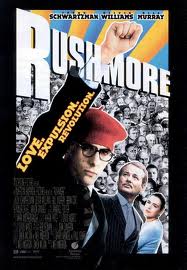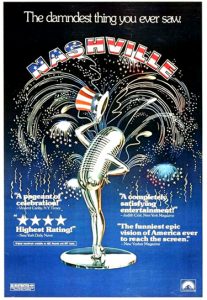Review by Dan Geddes
See also reviews of The Royal Tenenbaums and Moonrise Kingdom.
Jason Schwartzman … Max Fischer
Bill Murray … Herman Blume
Olivia Williams … Rosemary Cross
Seymour Cassel … Bert Fischer
Brian Cox … Dr. Nelson Guggenheim
Mason Gamble … Dirk Calloway
Sara Tanaka … Margaret Yang
Directed by Wes Anderson
Screenplay by Wes Anderson and Owen Wilson
_________________
Rushmore is an inspired piece of movie-making, refreshing and light on its feet. It’s the kind of movie that makes you feel more alive. It’s the kind of movie that may even make you want to try harder in life.
Rushmore features Max Fischer (Jason Schwartzman), an energetic prep school student who leads or participates in nearly every school activity, yet is failing all of his classes. His positive attitude impresses millionaire Herman Blume (Bill Murray), whose twin sons also attend Rushmore academy (“Never in my wildest imagination did I dream I would have sons like these,” laments Mr. Blume to Max.). The unusual friendship between Max and Mr. Blume is at the heart of the film. Max at 15 is already a formidable character, someone who makes things happen—writing and directing plays, lobbying to make Latin a requirement, building aquariums, sending formal invitations in calligraphy in his own hand. His energy attracts friends and supporters, not only Mr. Blume, but also Dirk Calloway, a younger student and Max’s scribe, and Miss Cross, an elementary teacher at Rushmore, whom Max befriends.
Max falls in love with Miss Cross immediately. She becomes his impossible object of desire. At the celebratory dinner that Blume treats him to (after the performance of his play, “Serpico”), he becomes jealous with rage when she brings along an old friend. Max drunkenly confesses his love for her. Despite their age gap, Max is not easily dissuaded. He conceives the idea of using Blume’s money to build an aquarium for Miss Cross (who has an interest in fish, and keeps a few fish tanks). When he is caught breaking ground for the aquarium on Rushmore campus without even having informed the administration, he is expelled from Rushmore.
Max has a honeymoon period at Grover Cleveland public high school (a montage to the tune of Cat Stevens’ “Here Comes My Baby”). He remains friends with Miss Cross and Mr. Blume (who along with Dirk, still revolve their lives around Max’s schedule of activities). Miss Cross tutors him up to passing grades. He attracts Margaret Yang, a student at Grover Cleveland, whom he casts in his new plays, but ignores her obvious interest in him.
The movie turns a corner when Dirk discovers that Blume and Miss Cross are having a fling. Max goes ballistic at this betrayal by his friends. He thinks of clever but extreme punishments for Blume, and maybe it is this point that the movie goes a bit wrong.
Rushmore’s tone is a kind of magical realism, where things are humorously exaggerated. It’s unlikely that anybody could be in all the activities that Max is, or that the high school actors would be known as the “Max Fischer Players,” or that a millionaire steel baron with a family would center his life around a teenage kid (“Didn’t Max have something planned for us today? A trip to a museum?”), however dynamic, but we accept these as part of the premise of the movie. Max is an unstoppable force of nature. If Max funnels bees into Blume’s hotel room, we laugh because only a well-rounded kid like Max would think of such a punitive measure. When Blume replies by running over Max’s bicycle with his car, that is fair enough, and it is still funny. But when Max cuts the brakes on Blume’s car, we are over the line into some exaggerated reality. This act tears at the fabric of the movie. It makes Max less sympathetic to us in a way that his earlier rude behavior did not. Max’s telling Blume’s wife about his affair and precipitating their divorce is similarly over the line (even though at their rooftop meeting Max hospitably offers Mrs. Blume a choice of sandwiches, peanut butter-and-jelly or tuna fish—“I’ll take the tuna fish,” she says, probably knowing what he’s about to tell her).
The movie finds it footing again shortly after this. Max withdraws and contemplates (to the tune of the Stones “I Am Waiting”), and finds a way to accept his losses and seek forgiveness from those whom he has wronged.
Ultimately, in Rushmore, forgiveness carries the day. Max forgives Blume and Miss Cross. Dirk forgives Max for telling a dirty lie about his mother. Blume forgives Max for his vengeful acts. Margaret forgives Max for being a jerk to him. The reconciliation scene between Max and Dirk is effective. The two friends are looking for a way to come back to each other; they miss each other. Similarly when Max invites Blume to his father’s barbershop and gives him one of his prized Rushmore pins, it is heartfelt, and we know that they are really friends.
Rushmore is also about kindness and propriety. Characters in Rushmore speak to each with a kind formality. The final scene where the principal characters are slow dancing after Max’s Vietnam play draws attention to the politeness of the characters. The introductions between Max, Margaret, Blume, Miss Cross and the Yang’s are almost exaggeratedly civilized, making this seem like a charmed circle to belong to.
Rushmore makes me feel more alive because it recalls those early high school years, when falling in love with an older girl who was impossibly out of reach, while painful, created feelings of yearning that have a special edge at that age. Max’s energy, his will to get the most out of life and his scholarship to elite Rushmore academy (the activities rather than education), are infectious and inspiring. “When one man, for whatever reason, has the opportunity to lead an extraordinary life he has no right to keep it to himself.” That is the quotation from Jacque Cousteau that Max finds written in pen in a book and that leads him to Miss Cross, who had donated the book to the Rushmore library. For Max, those are words to live by.
#
Why do I like this movie so much? Firstly, the characters and their relationships matter. Max has a lot of potential, so we care what happens to him. The characters operate according to a code of honor. Secondly, it is fast-moving and funny. The montage sequences (Max’s activities, Max’s early days at Grover Cleveland, Max and Blume friends again, planning their aquarium to the tune of “Oh Yoko!”) are especially well-done.
The soundtrack is nostalgic, mainly British invasion stuff, but refreshing and upbeat. Anderson and Mark Mothersbaugh pull together an eclectic mix of music that is central to film’s success (if the film works for you; if you don’t like the music you probably won’t like the movie).
Rushmore definitely owes a lot to Hal Ashby’s Harold and Maude (1971), which also focused on a friendship between a teenager and a much older adult. In Rushmore, the roles are reversed, and the younger person, Max, is the more life-affirming friend, injecting life into a world-weary Blume. But the similarities between the films are more about the visual style. Max and Blume meeting at the cemetery recalls Harold and Maude’s many trips to the cemetery. Max and Dirk flying their kites to Cat Stevens’ “The Wind” recalls the many beautiful outdoor scenes in Harold and Maude set to Cat Stevens’ music. Harold and Maude and Rushmore are both movies that celebrate life, with the prospect of death (Max’s mother died when he was young) a reminder of how short and priceless life is.
The cast is superb. Jason Schwartzman delivers an amazing performance, full of energy and chutzpah. It’s his movie. Bill Murray gives a funny, low-key performance as Blume. He makes it believable that Blume could befriend Max as equals. This was the first in a whole string of “indy” roles for Murray, who also went on to become a regular in the Wes Anderson troupe. Olivia Williams as Miss Cross is lovely and warm, an idealized object of love for Max, with her English accent giving her extra spice of class for American audiences. She’s tough when she needs to be, in a difficult role. Seymour Cassel is perfect as Max’s father, a barber who Max tells everyone is a brain surgeon so that he will have some status at Rushmore.
Rushmore is a lot of fun, but it also has heart. Anderson creates a world that is pleasant to inhabit, with characters that we care about. It was a vital stepping-stone on the way to The Royal Tenenbaums, still his best film to date.
See also reviews of The Royal Tenenbaums and Moonrise Kingdom.
Further Reading: The Humanists: Wes Anderson’s Rushmore by Colin Marshall






Be First to Comment